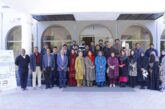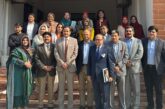Media Foundation360 organised another training session in Swat on July 3, 4 and 5, 2017. Participants for the Swat training were selected on the basis of their association with newspapers – they were all active journalists.
The participants were enthusiastic to learn. However, their qualification and professional caliber left much to desire. None of them had attempted investigative reporting before, much less one based on data journalism. Senior Journalist and Lead Trainer Aurangzaib Khan, flanked by co-trainers Waqar Gillani and Izharullah discussed skills of identifying focus statement of a story, Right to Information laws, data journalism, sources and interviews.
Forum
The forum was attended by the district administration. The Deputy Commissioner Amir Afaq – the top administrative officer at the district level – the Regional Director for Information Sarwar Khattak and Mayor Ikram Khan turned up at the forum and stayed back for tea to talk to reporters and trainers.
DC Amir Afaq had been in Peshawar before he was posted to Swat and had participated in consultations on the Khyber Pakhtunkhwa Right to Information Act 2013.
The forum opened with the Regional Director for Information Sarwar Khattak speaking about the role of the KP Information Department in relation to media. He said the Information Department’s primary role was to “project a positive image of the government through highlighting development activities.” He said whatever information and data is shared with media is done in keeping with the government’s policy on public relations and is “targeted” – aimed at giving the political government a favourable image.
Data, he said, is used for “knowledge building” about government initiatives and activities. Even though he claimed the department was “bridging the information gap” between the government and the media, it was clear that more than facilitating journalists to access information, his brief was public relations. He said that within the department, “mechanisms” existed to send suggestions on improvement of information flow to the commissioner even though these mechanisms were informal and not part of rules of business.
The Deputy Commissioner Amir Afaq said not just the Information Department but other line departments should also share information. He said he would take this up with the departments in his meeting with him to ensure that primary data and research is available at the departmental level and online. He did agree that the departments had a long way to go before a culture of information and data-clearing could be institutionalized at the departmental level. “We are still a conventional society in many ways.”
He said the local administration would take media on board (share information with) when it launches new development initiatives. “We rely on media to act as bridge between the citizens and the state.”
He said if a department does not respond to information request from a journalist, he or she could approach the DC’s office and seek his intervention to facilitate free flow of information. The Deputy Commissioner said he would have a focal person in the office to attend to such requests.
To improve data collection, he said he would meet officials from different departments to see what resources were available for collection of quantitative and qualitative data and analysis.
Recommendations
- Even though the DC seemed quite open to sharing information, he is a very busy man. He alone cannot attend to all information requests. Also, it is not clear if outside Bridging the Gap, reporters would ever make requests for information. It would be great if the local press club can follow up on his recommendation to have a focal person at his office to make sure one is appointed.
- There is no culture of data collection at the official level. Perhaps a training at the departmental level to incorporate data in development reporting would help government departments to make up for this.



















